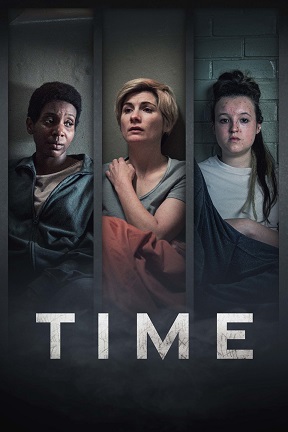TIME

UK, 2023, 3X 60 minutes, Colour.
Jodie Whitaker, Tamara Lawrance, Bella Ramsey, Siobhan Finneran.
Directed by Andrea Harkin.
The initial series of Time, written by Jimmy McGovern (cracker, priest) focused on a men’s prison, Sean bean is a prisoner, the impact of life in prison, his relationship with his wife and family, with Stephen as a guard, compromised with drug dealing in the prison.
In the second series, the focus is on a women’s prison, again written by Jimmy McGovern but with a female collaborator. The tone is very different from the first series. The atmosphere in women’s prison is certainly very different from the atmosphere in a male prison.
The film focuses on three central characters. Jodie Whitaker plays a mother who is convicted of fraud, trying to support her children, and, on release, again committing fraud and sentenced to prison. She is middle-aged, working class, tough yet vulnerable, an alcoholic mother, hearing her children will be taken into care, her oldest child hostile to her.
Tamara Lawrance plays a mother convicted of murdering her child, attacked by the other prisoners, and, at the end of the film, explanations given about her life with her husband, the pressures, her decision. In the prison, while she is attacked, she also is supportive of a young pregnant prisoner and helps in the delivery of her birth.
The third character is played by Bella Ramsey (The Last of Us), young, drug addict, taking drugs in prison, discovering she is pregnant, and this changing her whole perspective on her life, her relationship with her boyfriend, pusher, and her having to make decisions about giving him up to the law and the possibilities of getting her baby back.
Also in the story is the prison chaplain, a nun played by Siobhan Finneran, who has her own story (a relationship with a priest) but who is a good listener to each of the prisoners, runs discussion groups, sometimes has a powerful influence on the prisoners.
Quite a moving and insightful experience, perspectives on women in prison.
- The impact of the first series? Men’s prison? Transition to women’s prison?
- The title, doing time? Indication of days, sentences?
- The screenplay by Jimmy McGovern, his career, television series, films? The insights of the first series? Cowriting here with a female writer? Sensibilities?
- Three parts, three central characters, crises and resolutions, interactions?
- The visuals of prison, add in the countryside, the range of buildings, the exteriors, the roads, the gardens? The interiors, brooms, the common room, the cells? Visitors room? Court sequences? The musical score?
- The credibility of the stories? Women’s stories, their psychology, women’s crimes? Murder, drugs, fraud? Issues of violence? The range of characters, race, culture? The interactions, violent, verbal, angers, taking hostages, humiliations? The overall credibility?
- The authorities, and then guardian to remote, the guards? The women, treating the prisoners, the rules, likes and dislikes, helps and hindrances?
- The character of the chaplain, Catholic background, none, counselling, the capacity for listening, setting up the groups, the effect of the groups, the interactions with Orla, with Kelsey, with Gabi, and Gabi’s story, reluctant? The invitation is the group? Her own story to Gabi, the priest, the relationship? Her effect as a chaplain?
- Orla, single mother, the three children, her own alcoholic mother, trying to manage, the need for money, the commitment of the fraud, the arrest, her reactions, the sentence? The cell, with the others? The visit of her mother and reprimanding her mother? Her mother’s promises to help the children? The three children, Kyle and his resentment? Phone calls to her mother, the contacts, her failing, the issue of custody of the children? Released, the repeat fraud, her return? The relationship with Kelsey, helping her? The relationship with Gabi, initial antagonism, the help? The siege situation, the knife at the throat of the prisoner, her frustration to make representations to the authorities? The help of the chaplain? The new sentence? Kyle, his birthday, the phone calls, his not coming, ashamed? Finally leaving, the tent accommodation, the meeting with Kyle, the promises?
- Gabi, accused of the murder of her baby, race issues, the way she was treated in prison, the various attacks, slicing her, the humiliation of her clothes in the shower? Her relating with others, reserve? Her sponsoring of Kelsey, helping with the birth of the baby, the baby called Daniel after her own baby’s name? A caring person? The relationship with the chaplain, discussions, going to the meetings, the women’s reactions, condemnation? Telling her story, the flashbacks, the relationship with a husband, the birth, depression, the crying baby? Killing the baby? The final meeting, her story, the group hearing it, the final promises? And her being the facilitator for the chaplain to tell her story?
- Kelsey, her age, on drugs, her attitude, going to prison, taking the drugs, their being smuggled in? The relationship with Adam, the drugs? Discovering she was pregnant, the decision to change, take no drugs, the possibilities of being a mother, the months passing, the treatment by the others, the difficulties of the birth, Gabi sent helping? Calling the baby Daniel? Adam and his visit, smothering smuggling the drugs, her being arrested, the cell, the possibilities for the future, the anguish and letting the baby go? The various threats? The court, her giving up Adam, his threats, the return of the baby, the applause as she left prison?
- Gabi, the visit from her husband, his next marriage, the visuals of the past, his treatment of Gabi, of the child?
- The drunk mother, receiving the card, her son, the other woman and her motivation for sending it? Her son hating her? The division of the chaplain, the meeting for restorative justice and reconciliation?
- Images of Justice, punishment, care, rehabilitation?